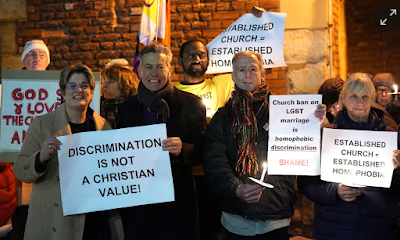Protecting religious freedom while safeguarding LGBTI+ rights
In discussions surrounding proposed changes to the Queensland Anti-Discrimination Act, tensions have flared between safeguarding religious freedoms and protecting LGBTI+ rights. These amendments, designed to limit the employment powers of religious institutions, have ignited strong reactions from Queensland Churches Together, who see them as a threat to their core beliefs. However, amidst this debate, it's vital to ensure that any legislation maintains a delicate balance, upholding the rights of all individuals, including LGBTI+ people, without compromising religious liberties.
At the heart of the matter lies the challenge of balancing religious autonomy with preventing discrimination. Traditionally, religious organizations have enjoyed autonomy in their hiring practices, enabling them to cultivate communities in accordance with their beliefs, sometimes leading to the perpetuation of discrimination at their discretion. Yet, as societal attitudes evolve, it's crucial to reassess these practices to avoid inadvertently discriminating against marginalized groups, including LGBTI+ individuals.
Critics of the proposed changes argue that narrowing the criteria for employment decisions within religious institutions could limit opportunities for those who don't adhere to traditional doctrines. This concern, voiced by groups like Queensland Churches Together, suggests that such changes risk imposing secular perspectives on religious matters and infringing upon institutional freedoms.
Conversely, advocates for LGBTI+ rights argue that current frameworks permit discrimination under the guise of religious freedom. They emphasize that individuals should not face discrimination based on sexual orientation or gender identity, especially in educational or institutional settings. For LGBTI+ individuals, access to employment opportunities should not hinge on conforming to specific religious beliefs.
Navigating these complexities requires exploring avenues for compromise that uphold the rights of both religious institutions and LGBTI+ individuals. One potential solution, proposed by Professor Alex Deagon and supported by Queensland Churches Together, is the implementation of positive associational rights. By affirming religious institutions' right to maintain a faith-based culture while prohibiting discrimination based on protected characteristics, a balance can be struck.
Ongoing dialogue between faith communities, LGBTI+ advocacy groups, and government entities is crucial in crafting legislation that reflects Queensland's diverse society. By considering a range of perspectives, policymakers can develop laws that promote harmony and mutual respect among all community members.
Reflecting on these suggested changes brings to light the real-life stories of those who have faced discrimination within religious organizations. As detailed in my book "Faith and Sexuality" after protracted litigation, I recently reached a resolution with the Anglican Church via the Australian Human Rights Commission, addressing a breach of my human rights based on sex discrimination.
Advocating Against Discrimination within Religious Institutions in Australia (Australian Christian Churches):
Regrettably, today I have initiated another case with the Australian Human Rights Commission against Chapliancy Australia and Alphacrusis University, a branch of the Australian Christian Churches (ACC). Through this action, I aim to bring attention to the entrenched problem of discrimination, specifically directed towards LGBTI+ individuals, within certain religious institutions. My experiences with these organizations highlight the urgent need for extensive legislative reforms across the nation to uphold equality and eliminate discrimination.
My time at Alphacrusis University, a part of ACC, has exposed a concerning prevalence of entrenched homophobia within ACC, extending into its university and chaplaincy services. For example, I encountered refusal of access to Pastoral Supervision services within Chaplaincy Australia as a component of my Chaplaincy studies, solely because of my sexuality. The professional supervisor justified this denial by deeming my sexual orientation incompatible with the service which is in itself contrary to their code of coduct. Such a denial of services constitutes a clear violation of my human rights and breaches the Sex Discrimination Act. After consultation with my church, I have withdrawn from my chaplaincy studies with Alphacrusis and will pursue my Clinical Pastoral Education (CPE) with another university that aligns more closely with the values that Jesus so clearly taught us to abide in.
Upholding the Universal Declaration of Human Rights and strengthening recommendations from entities like the Queensland Human Rights Commission are crucial steps in addressing systemic discrimination within religious institutions. By incorporating our voices into the legislative process, policymakers can develop legislation that safeguards religious freedom while promoting equality and inclusivity.
These reforms must be undertaken in consultation with stakeholders, including the LGBTI+ community, to ensure their effectiveness. Furthermore, it's crucial to enhance the proposed amendments by incorporating input from those who have directly experienced discrimination. By doing so, Queensland can take significant strides towards creating a genuinely inclusive and fair society and hopefully the rest of the country can follow suit. Grace and peace be with you.
Editors Note: In the discussion of homosexuality within the context of Assemblies of God, it's essential to consider the official stance as articulated by the ACC. On Tuesday, March 7th, 2006, the Assemblies of God released a statement outlining its position on homosexuality. As part of this, a link to the ACC's official position has been included for further reference and understanding. The Assemblies of God statement on homosexuality highlights issues of equality and autonomy from a human rights perspective and is inconsistent with the biblical principles of love, compassion, non-judgment, and the Golden Rule.







TWO POSTS, IF I MAY, TO ACCOMMODATE YOUR SIZE LIMITATION. THANK YOU! MY FIRST POST:
ReplyDeleteI write in solidarity, as a practicing Gay Catholic, to address a matter relating to the review, currently being undertaken, of Commonwealth Anti-Discrimination legislation that permits religious institutions to discriminate against LGBT+ staff in their/our employ as well as LGBT+ students enrolled in their/our schools. At an Australia-wide level the lead position on this matter has been taken by the Catholic Archbishop of Melbourne speaking, as is our custom, on behalf of all the Australian Catholic bishops. Hence the impossibility of registering dissent in the popular Catholic media, even though it is known that some bishops disagree with him in private.
This highlights a problem within our Church, which attaches primary emphasis on unity, even when there is manifest disagreement within our ranks on LGBT+ issues, themselves reflected in the anomalous position of Pope Francis, whose advocacy on this question is reflected in his publicly-announced preference of 'widening the tent' over a resort to the canonical code, which tends to favour clear judgment and unbudging attachment to 'fortress Catholicism' positions of the kind championed by the late Cardinal Pell.
The net effect is for Catholics to adopt 'under the radar' positions, at odds with the canonical code but reflecting the softer, more pastoral traditions of the Church on LGBT+ and similar questions. This translates in contemporary parlance to the Catholic authorities adopting a 'Don't ask; don't tell' position, especially for those employed in Australia's vast network of Catholic schools.
The trouble with this attitude is that it clashes with official Church teaching, which states that 'we teach who we are' which, in the context of the Catholic school, sets up a dilemma for LGBT+ teachers and parents about the problem of adhering to an authenticity that, in light of current neurobiological and neuroscientific research, finds that human sexual identity is far more complex than as originally framed within both the Book of Genesis as well as the theological summations of St Thomas Aquinas.
Additionally, senior appointees to Catholic educational positions, drawn from their membership of the Labor Right and resolutely committed to the Whitlam settlement that brought the ALP into power (after categoric opposition from the DLP, and which kept Labor out of power in Canberra for more than two decades) are locked into a conservative alliance with other denominations, ostensibly to ensure consolidation of state-aid for non-government schools, but in the context of which the shots are called by fundamentalists on all sides, who view caving in to so-called LGBT+ demands to lift anti-discrimination exemptions as the thin end of a wedge that would result in a loss of identity for both Catholic and non-Catholic Christian schools.
Hey Michael, just a quick followup from my last message and wanted to let you know that "LGBTQ Catholic Ministry: Past and Present" by Jason Steidl was rated the #2 spot for LGBT books on qspirit.net. It explores the dive into the world of grassroots LGBTQ Catholic movements over the past 75 years and may be helpful.
DeleteMY SECOND POST NOW FOLLOWS, THANK YOU!
ReplyDeleteThis brings to the fore a terrible dilemma for Australian Catholics, committed as they/we have been over many generations to building school systems, widely agreed across the polity to be second to none in size and, more contentiously, influence, and which are currently under pressure to cave into the human rights imperatives that drive public opinion across all sides of the polity.
My own interest in this matter is as a passionate exponent of human rights which, contested though they are by some of the more fundamentalist Churches, have come to inflect the interpretative scriptural understandings of many Catholics, Anglicans and members of the Uniting Church of Australia accepting, as many among us, both straight and gay, are, of a more ameliorative and inclusive view of human diversity and in the case of my own Catholic family of origin, especially since Vatican II.
The impact of my post would be puny were it simply to languish in the wound-licking doldrums of explanation and analysis, for I am called, as both a Christian and an LGBT+ person, to express my indignation and righteous anger at the anomalous position of the Church I have known and loved since my birth and which now results, as I have evidence to prove since the award of my PhD, of the contradiction inherent in my Church signing up to Australia's National Catholic Safeguarding Standards, which safeguard vulnerable minors as well as adults - a toolkit and strategy if ever there was one -for safeguarding LGBT+ students and staff in Catholic schools, while simultaneously committed to the retention of anti-discrimination exemptions.
The further irony in this is that such exemptions have been lifted in all other OCED jurisdictions (except the US, where religious schools remain constitutionally unfunded) and as a consequence of which religious schools with open enrolment and employment policies are fully-funded by the state, thereby increasing school access, central to raising education outcomes, for parents keen to exercise choice but unable to afford fees.
I hope my timid plaint adds at least some comfort and insight into why Jesus wept so bitterly in His 'Hour of Need' in the Garden of Gethsemane. His Crucifixion, shared with those of us whom we Christians teach as made - each and every one of us! - in God's Very Own Loving Image, must have come as a relief to Him in the face of the position adopted by those ordained to shepherd the rest of us in His loving ways!
Dr Michael thank you for boldly addressing the challenges of discrimination within your Catholic community - your post resonates deeply with the complexities and tensions that many of us within the church face regarding issues of discrimination particularly against the LGBT+ community. The notion of "Don't ask... don't tell" may have been a coping mechanism for some but it falls short of upholding the true essence of Christian love and acceptance. The disparity between the policies of Catholic institutions and those of other jurisdictions is glaring and its something that demands urgent reflection and action. Your reference to Jesus' agony in the Garden of Gethsemane is poignant and indeed the disparity between the teachings of love, compassion, and inclusion that He embodied and the realities of discrimination and exclusion we see today evoke profound sorrow. We are planning a follow-up story in the upcoming weeks and we're eager to include more of our readers perspective in it. Would you be willing to share further details of your story with us?
Delete